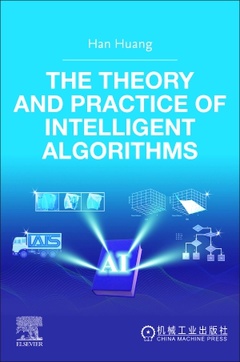The Theory and Practice of Intelligent Algorithms
Auteurs : Huang Han, Hao Zhifeng

The content of each chapter is supported by papers published in top journals. The book's authors introduce the work of each part, which mainly includes a brief introduction (mainly for readers to understand) and academic discussion (rigorous theoretical and experimental support), in a vivid and interesting way through excellent pictures and literary compositions. To help readers learn and make progress together, each part of this book provides relevant literature, code, experimental data, and so on.
2. Application of intelligent algorithms in logistics scheduling
3. Application of intelligent algorithms in software testing
4. Application of multiobjective optimization intelligent algorithm
5. A new method for time complexity analysis of intelligent algorithms
Dr. Huang is a professor and doctoral supervisor of the School of Software Engineering at South China University of Technology. He is currently serving as an associate editor of IEEE Transactions on Evolutionary Computation (IF: 14.3), Complex & Intelligent Systems (IF: 5.8) and IEEE Transactions on Emerging Topics in Computational Intelligence (IF: 5.3), and Director of Teaching Steering Committee for Software Engineering of Undergraduate Colleges and Universities in Guangdong Province. Prof. Huang has made great contributions to the scholarship on the theories and application of intelligent optimization algorithms. For example, he has proposed a time complexity analysis method of real-world evolutionary algorithms, algorithms for efficient and accurate image matting, a method for automated test case generation based on path coverage, etc. Prof. Huang has hosted more than twenty national and provincial projects. He has published two books, Theory and Practice of Intelligent algorithm and Theory, Methods and Tools for Time Complexity Analysis of Evolutionary Algorithm. He has also published more than 80 papers in IEEE TCYB, IEEE TETC, IEEE TSE, IEEE TEVC, IEEE TIP, IEEE TFS, and Science China, including ESI highly cited papers. As the first inventor, Prof. Huang has 47 invention patents granted in China and seven invention patents granted in the United States. He won China Patent Excellence Award and developed an association standard entitled “Standard for glass-box testing without source code as the first completer. Additionally, Prof. Huang pays attention to social services. Over the past five years, he has given more than 50 public lectures on science and technology for government offices, primary and secondary schools, CCF, YOCSEF, media, etc. He has been in charge of the development and release of six public software systems such as Unit Test Algorithm Platform ww
- Integrates the theoretical analysis results of intelligent algorithms, which is convenient for the majority of researchers to deeply understand the theoretical analysis results of intelligent algorithms and further supplement and improve the theoretical research of intelligent algorithms
- Opens up readers' understanding of the theoretical level of intelligent algorithms and spreads the inherent charm of intelligent algorithms
- Integrates the diverse knowledge of society and provides a more comprehensive and scientific knowledge of intelligent algorithm theory
Date de parution : 06-2024
Ouvrage de 250 p.
15x22.8 cm



